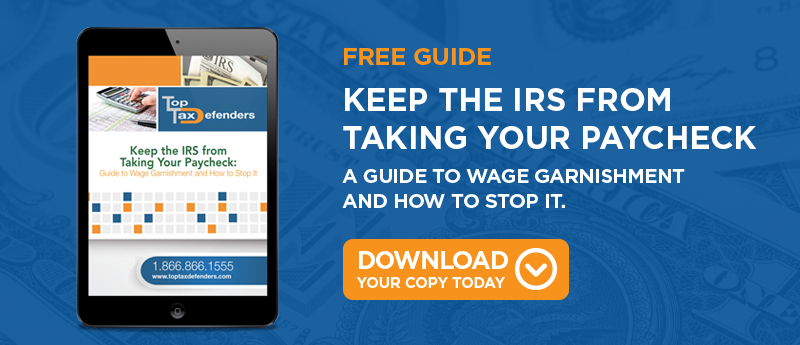
Can you get a refund if you owe back taxes? The simple answer is … maybe. As in, it depends on whether you owe less in tax debt than you have coming to you as a refund. There are several reasons the IRS might hold up your refund or seize it to pay for other debt.
On the other hand, all is not lost. There are also several things the federal government can’t and won’t do with your refund when it comes to other debt, such as to collection agencies.
When should you worry about not getting your tax refund? What reasons could the IRS have for taking your refund? And how can you protect your refund in the future?
If you have an inquiring mind and want to know, continue reading.
Should You Worry About Losing Your Refund?
Federal law only allows state and federal government agencies to seize your refund. Individual and private creditors cannot take your refund to pay toward your debt. At least, not until you place the funds in your bank account.
Once you place your refund in the bank, it becomes fair game for creditors outside the government. Still, it depends on state law whether or how private creditors can access those funds.
Why the IRS May Hold Up Your Refund
The federal government can hold on to your tax refund for several reasons:
- They question the accuracy of your tax return.
- You owe back taxes from previous years.
- You haven’t filed one or more tax returns in previous years.
- There is a problem with your account at the IRS.
- You are on a payment plan for back taxes.
- You owe certain other debts, such as student loans, back child support, and outstanding unemployment compensation repayments.
- You owe back taxes to the state government.
The IRS can keep your tax refund to pay any federal debt you have. If you already know you owe back taxes, you shouldn’t expect to receive a refund. However, you may not realize that skipping tax filing altogether allows the IRS to keep the refund, too.
Federally backed student loans, since they come from the government, allows that same government to pay back your loans using your refund. Skipping child support proves costly as well since Uncle Sam is allowed to use your refund to pay it.
The feds also will support the state tax agency in grabbing your refund if you didn’t pay the state at tax time. If you live in one of the 43 states with an income tax, you may wish you had paid if you want your federal refund.
Something that may surprise you: if you are on a payment plan for last year's taxes, the IRS may decide to hold onto your refund while determining whether to apply it to your tax debt. It's possible that due to a substantial tax debt or because you skipped or were late on one or more payments, the federal government might decide your refund is best used to help pay down your back taxes.
TOP - Treasury Offset Program
Another way the federal government can get its hands on your refund is through the Treasury Offset Program or TOP. This is a financial services bureau within the Treasury Department. It acts as a collection agency for the federal and some state governments.
TOP can take some or all of your refund to satisfy an array of debts, including those listed above. The agency can also use the refund for non-tax federal defaulted debts, such as payments on HUD loans or fines, fees, or penalties from other federal agencies.
TOP acts as a debt collector for some state tax agencies and can collect on tax debt for them. Finally, if you owe money to a state unemployment compensation fund, TOP collects for that, too.
Who Has Priority?
Would you be shocked to know the IRS has the first priority on your refund? If you aren't current on your federal income tax payments, that is the first place your refund will go. The IRS must always be paid first.
- Once the IRS gets their cut, the next in line is child support payments.
- After that come non-tax federal debts such as student loans.
- State governments are at the bottom of the payment ladder for your garnished refund.
Bankruptcy and Your Tax Refund
It is possible to get an exemption to protect all or part of your refund. It all depends on state law where your bankruptcy is being handled. The trustee can request the court to take your refund to pay non-tax debts.
On the bright side, outside of bankruptcy the refund cannot be garnished by collection agencies. Any credit card debt that is not related to your bankruptcy cannot have it, either. The same goes for overdrawn checking accounts and bank charges.
Protecting Your Refund in the Future
In a perfect world, you would file your taxes on time every year. You would pay any taxes you owe when you owe them. And in some years, you may be lucky enough to get a refund.
Unfortunately, we don’t live in a perfect world, so it's important to set up a few protections for yourself.
Suppose you are married and typically file jointly. You may decide to file separately to keep yourself apart from your spouse’s tax debts. It’s a good idea to know what shape your financial household is in, even if your spouse takes care of everything.
If you file married, filing jointly, and your spouse owes a tax debt, you don't want your part of a joint refund taken. You can file an Injured Spouse Claim on Form 8379 Injured Spouse Allocation. You are telling the IRS that you upheld your part of the tax bargain.
Qualification for injured spouse includes having your own income, making tax payments or having them withheld from your income, and expecting a refund of all or some of those taxes. By the way, this is not the same as innocent spouse relief. Innocent spouse protects against falsified tax returns from your spouse, underreported income, tax evasion or fraud, or other acts for which the penalty could apply to both of you no matter who did it.
If you think too much is being taken from your paycheck, you can reduce your withholding. Consult with a tax professional to make sure your W-4 withholding is reasonable without going overboard. Alternatively, the IRS has a tax withholding estimator you can use to calculate the correct amount.
Understand Your Responsibilities
Anything that can cause your refund to be garnished occurred before your tax refund is processed. You should know whether you owe back taxes, back child support, or payments on a student loan.
Never be afraid to ask for help. Top Tax Defenders is ready to assist you in taking back control of your tax debt. Don’t wait until you are in too deep.




